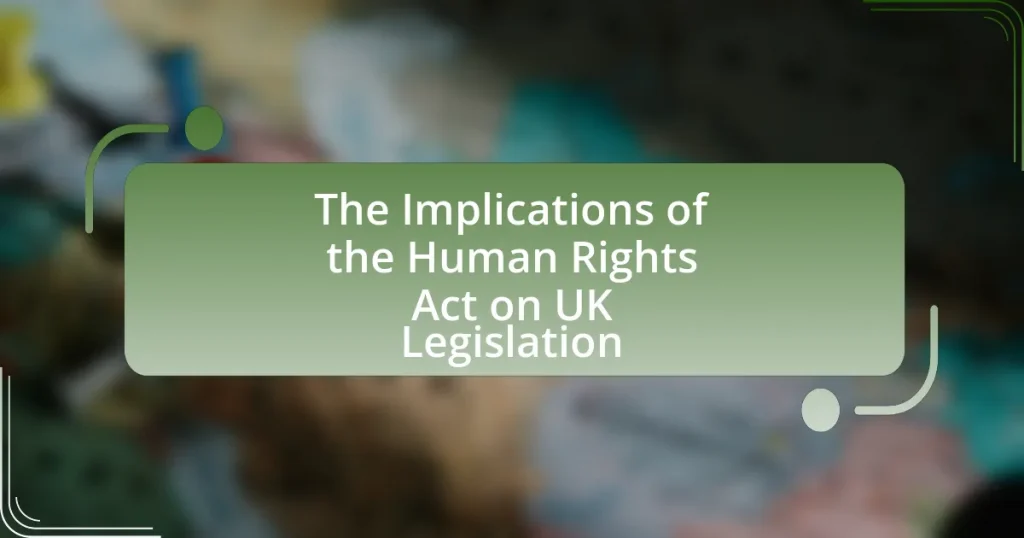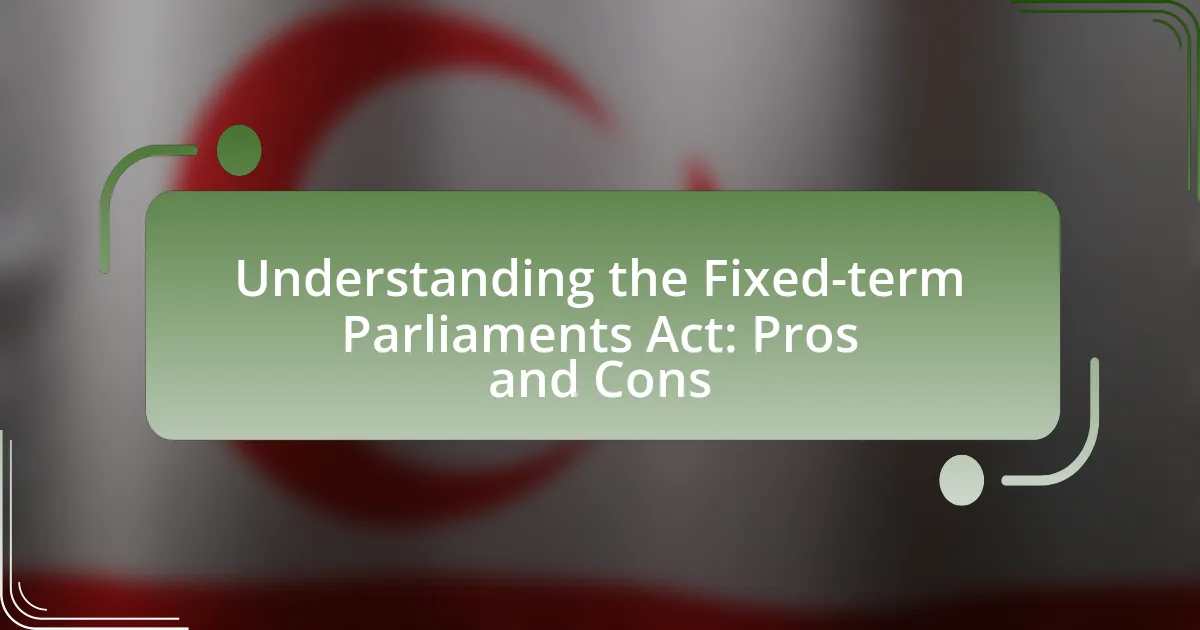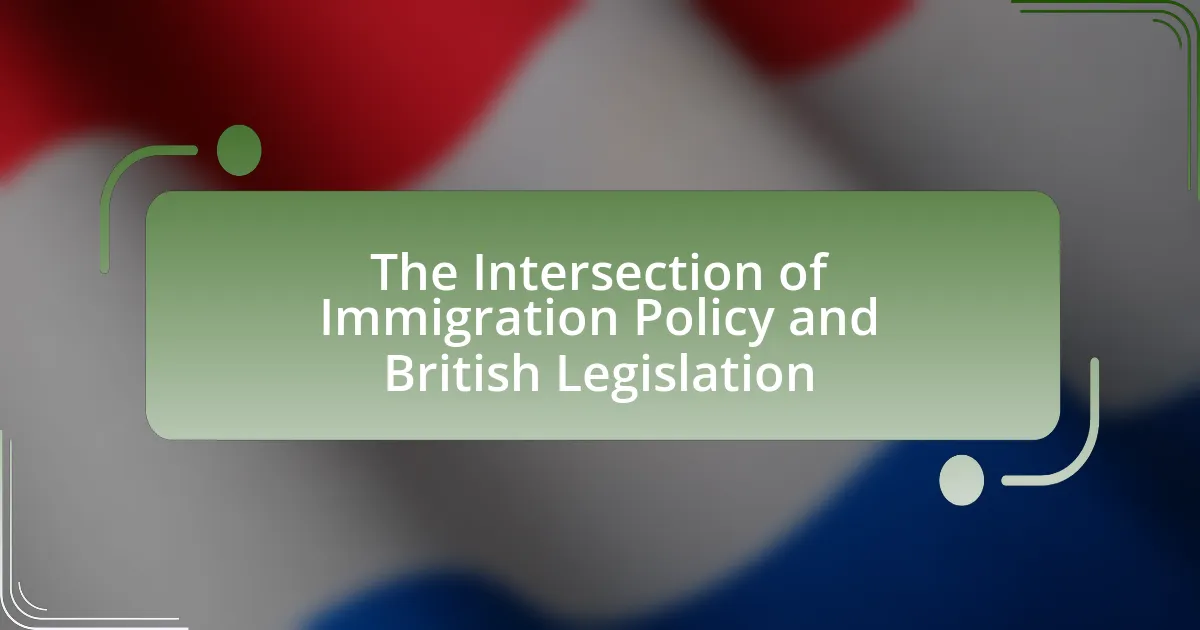The Human Rights Act 1998 is a pivotal piece of legislation in the UK that mandates public authorities to act in accordance with the rights outlined in the European Convention on Human Rights. This Act has significantly influenced UK law by allowing individuals to challenge public authorities in court, leading to landmark rulings that shape various legal areas, including privacy, freedom of expression, and anti-discrimination measures. Key provisions of the Act require compliance with fundamental rights, impacting legislative processes and judicial decisions. The Act also plays a crucial role in promoting equality and non-discrimination, while facing criticisms regarding its implications for national security and parliamentary sovereignty. The ongoing debates surrounding potential reforms highlight the dynamic relationship between the Human Rights Act and the evolving political landscape in the UK.
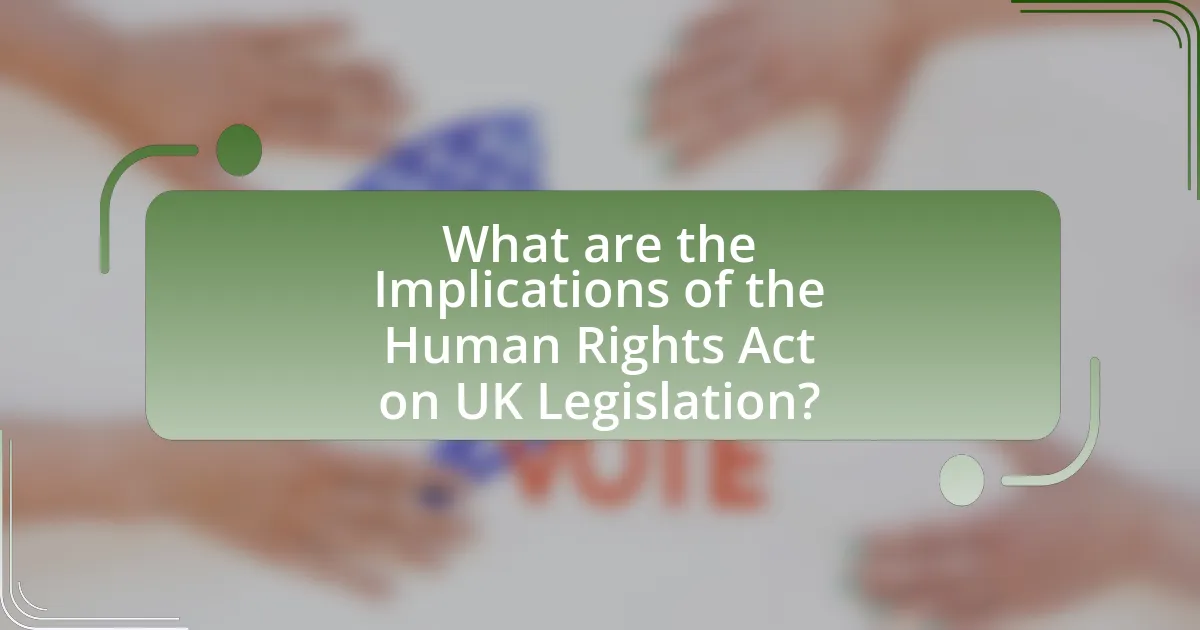
What are the Implications of the Human Rights Act on UK Legislation?
The Human Rights Act 1998 significantly impacts UK legislation by requiring all public authorities to act in accordance with the rights outlined in the European Convention on Human Rights. This legal obligation means that UK courts must interpret legislation in a way that is compatible with these rights, influencing the development and application of laws across various sectors, including criminal justice, healthcare, and education. For instance, the Act has led to changes in laws regarding privacy, freedom of expression, and the right to a fair trial, as courts have struck down or amended legislation that conflicts with human rights standards. The Act also empowers individuals to challenge public authorities in court, thereby enhancing accountability and promoting a culture of respect for human rights within the UK legal framework.
How has the Human Rights Act influenced UK law since its enactment?
The Human Rights Act has significantly influenced UK law by incorporating the European Convention on Human Rights into domestic legislation, allowing individuals to challenge public authorities in UK courts. Since its enactment in 1998, the Act has led to landmark rulings that have shaped various areas of law, including privacy rights, freedom of expression, and anti-discrimination measures. For instance, the case of “R v. Secretary of State for the Home Department, ex parte Simms” (2000) established that freedom of expression is a fundamental right, reinforcing its protection in UK law. Additionally, the Act has prompted legislative changes, such as the introduction of the Equality Act 2010, which consolidates anti-discrimination laws, reflecting the principles enshrined in the Human Rights Act.
What key provisions of the Human Rights Act impact UK legislation?
The key provisions of the Human Rights Act that impact UK legislation include the right to life, the prohibition of torture, the right to a fair trial, and the right to respect for private and family life. These provisions require UK laws and public authorities to comply with the European Convention on Human Rights, which the Act incorporates into domestic law. For instance, Section 6 of the Act mandates that public authorities must act in a way that is compatible with the rights outlined in the Convention, thereby influencing legislative processes and judicial decisions. Additionally, the Act allows individuals to challenge legislation that is incompatible with their rights, reinforcing the protection of human rights within the UK legal framework.
How do courts interpret the Human Rights Act in relation to UK laws?
Courts interpret the Human Rights Act by ensuring that UK laws are compatible with the rights enshrined in the Act. This interpretation is guided by the principle that UK legislation must be read and given effect in a way that is consistent with the European Convention on Human Rights, as established in the Human Rights Act 1998. For instance, Section 3 of the Act mandates that courts must interpret legislation in a manner that upholds human rights, unless it is impossible to do so. This has led to significant case law, such as the case of R v. Secretary of State for the Home Department, where the courts emphasized the importance of aligning domestic law with human rights obligations.
What are the broader societal implications of the Human Rights Act?
The broader societal implications of the Human Rights Act include the enhancement of individual freedoms, the promotion of equality, and the establishment of a legal framework for accountability in public authorities. The Act has led to increased awareness and protection of human rights, influencing societal norms and expectations regarding justice and fairness. For instance, it has empowered individuals to challenge unlawful actions by the state, thereby fostering a culture of accountability. Additionally, the Act has contributed to the development of anti-discrimination laws, promoting equality across various sectors, including employment and education. This legal framework has been instrumental in shaping public policy and societal attitudes towards marginalized groups, ensuring that their rights are recognized and upheld.
How does the Human Rights Act affect individual rights in the UK?
The Human Rights Act significantly enhances individual rights in the UK by incorporating the European Convention on Human Rights into domestic law. This legislation allows individuals to seek legal remedies in UK courts for violations of their rights, such as the right to life, the right to a fair trial, and the right to privacy. The Act mandates that public authorities must act in accordance with these rights, thereby ensuring that individuals can challenge unlawful actions or decisions. For instance, the Act has been instrumental in cases like the landmark ruling in “R v. Secretary of State for the Home Department, ex parte Simms,” where the House of Lords emphasized the importance of free speech as a fundamental right protected under the Act.
What role does the Human Rights Act play in promoting equality and non-discrimination?
The Human Rights Act plays a crucial role in promoting equality and non-discrimination by incorporating the European Convention on Human Rights into UK law, which mandates that all individuals are entitled to the same rights and freedoms without discrimination. This legal framework enables individuals to challenge discriminatory practices in courts, ensuring that public authorities uphold principles of equality. For instance, Article 14 of the Convention explicitly prohibits discrimination on various grounds, including sex, race, and religion, thereby providing a basis for legal recourse against inequality. The Act has led to significant case law that reinforces the importance of equal treatment, such as the landmark case of R v. Secretary of State for Work and Pensions, which highlighted the need for policies to consider the impact on vulnerable groups.
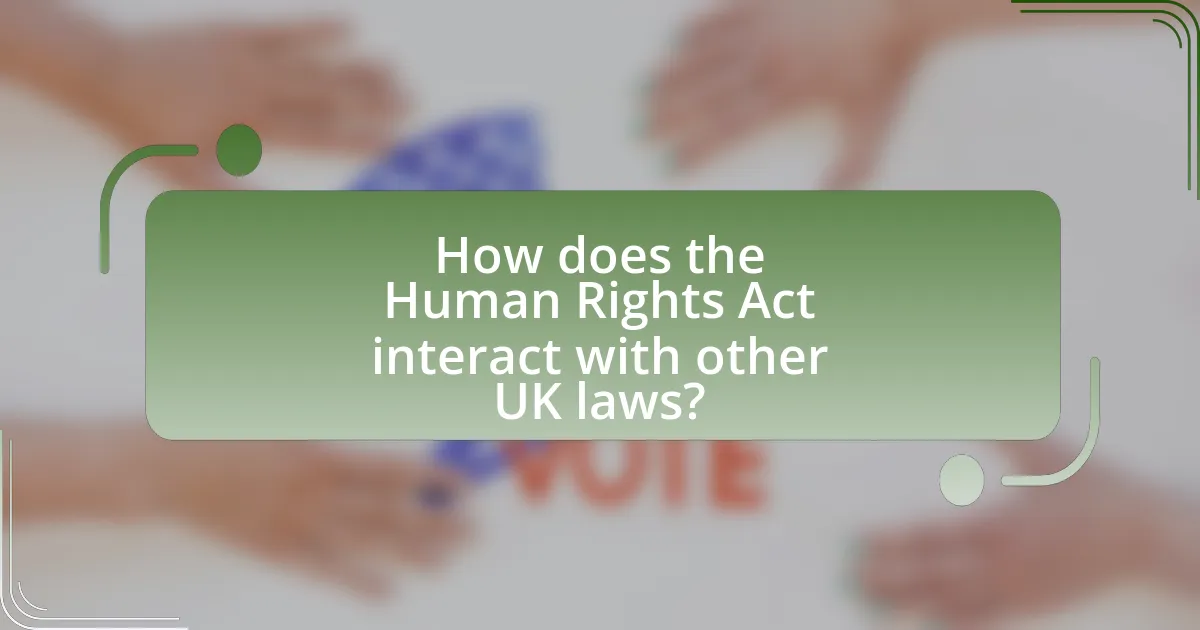
How does the Human Rights Act interact with other UK laws?
The Human Rights Act 1998 interacts with other UK laws by requiring that all legislation be interpreted in a manner compatible with the rights enshrined in the Act. This means that courts must consider the Act when making decisions, ensuring that UK laws align with the European Convention on Human Rights. For example, Section 3 of the Human Rights Act mandates that legislation should be read and given effect in a way that is compatible with the Convention rights, unless it is impossible to do so. This interaction has led to significant legal precedents, such as the case of R v. Secretary of State for the Home Department, where the courts ruled that certain immigration laws were incompatible with the right to a fair trial. Thus, the Human Rights Act serves as a critical framework that influences the interpretation and application of UK laws, promoting human rights standards across the legal system.
What are the conflicts between the Human Rights Act and existing UK legislation?
The conflicts between the Human Rights Act and existing UK legislation primarily arise from the tension between individual rights and parliamentary sovereignty. For instance, the Human Rights Act mandates that public authorities must act in accordance with the European Convention on Human Rights, which can contradict UK laws that do not align with these rights. A notable example is the conflict between the right to a fair trial under Article 6 of the Convention and certain provisions of UK anti-terrorism legislation, which may allow for detention without trial. Additionally, the courts have occasionally found UK laws incompatible with the Human Rights Act, leading to legal challenges and calls for legislative reform. This dynamic illustrates the ongoing debate regarding the balance of power between human rights protections and legislative authority in the UK.
How do courts resolve conflicts between the Human Rights Act and parliamentary sovereignty?
Courts resolve conflicts between the Human Rights Act and parliamentary sovereignty by interpreting legislation in a manner that upholds human rights while respecting the authority of Parliament. The Human Rights Act, enacted in 1998, requires UK courts to interpret laws in a way that is compatible with the European Convention on Human Rights. When conflicts arise, courts may issue declarations of incompatibility, which signal that a law does not align with human rights standards but do not invalidate the law, thereby maintaining parliamentary sovereignty. This approach allows Parliament the opportunity to amend the legislation if it chooses, exemplifying the balance between protecting individual rights and upholding legislative authority.
What examples illustrate the interaction between the Human Rights Act and specific UK laws?
The interaction between the Human Rights Act and specific UK laws is illustrated by cases such as R (on the application of Daly) v Secretary of State for the Home Department, where the House of Lords ruled that the prison policy violated the right to respect for private and family life under Article 8 of the European Convention on Human Rights. Another example is the case of Ghaidan v Godin-Mendoza, where the House of Lords interpreted the Rent Act 1977 in a manner consistent with the Human Rights Act, allowing same-sex couples to inherit tenancies. These cases demonstrate how the Human Rights Act influences the interpretation and application of existing UK legislation to ensure compliance with human rights standards.
How does the Human Rights Act influence public policy in the UK?
The Human Rights Act influences public policy in the UK by embedding the principles of the European Convention on Human Rights into domestic law, which requires public authorities to act in accordance with these rights. This legal framework compels policymakers to consider human rights implications when formulating legislation and public services, ensuring that policies do not infringe on individual rights such as the right to life, freedom from torture, and the right to a fair trial. For instance, the Act has led to significant changes in areas such as immigration policy and policing practices, where courts have ruled against policies that violate human rights standards, thereby shaping the development and implementation of public policy in the UK.
What impact does the Human Rights Act have on government decision-making?
The Human Rights Act significantly influences government decision-making by requiring public authorities to act in accordance with the rights enshrined in the Act. This legal obligation compels government bodies to consider human rights implications in their policies and actions, ensuring that decisions do not violate individual rights such as the right to life, the right to a fair trial, and the right to privacy. For instance, the Act has led to changes in legislation and policy, such as reforms in detention practices and the treatment of asylum seekers, reflecting the necessity to comply with human rights standards. Additionally, courts can review government actions for compatibility with the Act, which further reinforces accountability and adherence to human rights principles in the decision-making process.
How do public authorities comply with the Human Rights Act in their operations?
Public authorities comply with the Human Rights Act in their operations by ensuring that their actions and decisions respect and uphold the rights enshrined in the Act. This compliance is mandated by Section 6 of the Act, which states that it is unlawful for public authorities to act in a way that is incompatible with the European Convention on Human Rights. Public authorities implement training programs for staff, establish policies that align with human rights standards, and conduct regular assessments to evaluate their adherence to these rights. Additionally, they are required to consider human rights implications in decision-making processes, as demonstrated by case law where courts have held public authorities accountable for breaches of the Act, reinforcing the necessity for compliance in their operations.
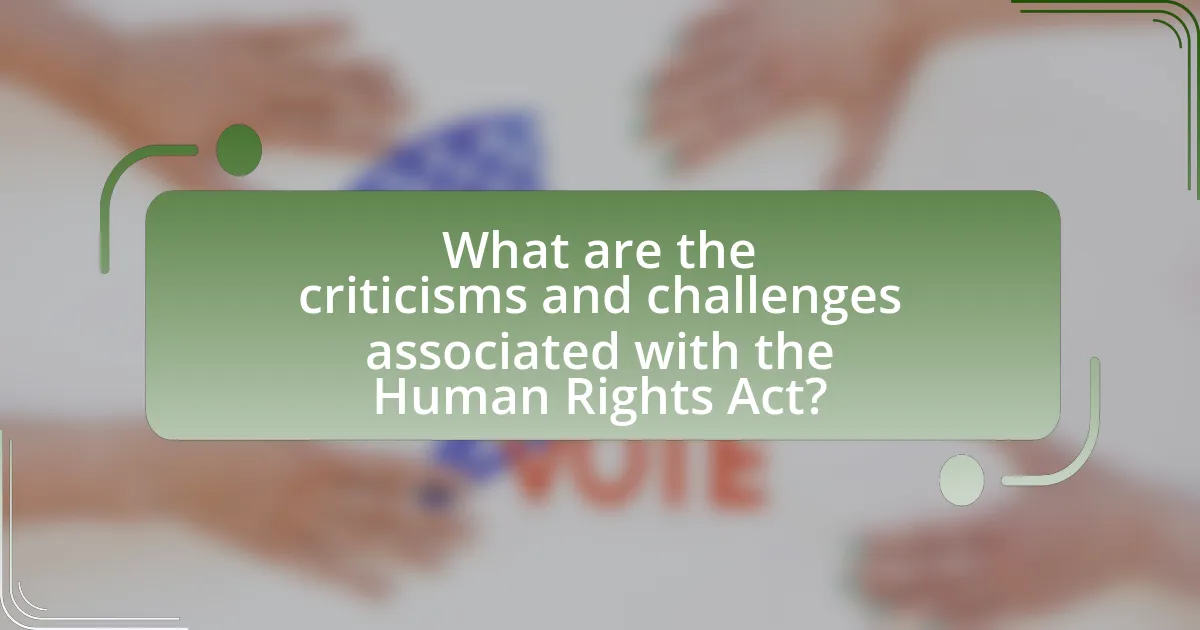
What are the criticisms and challenges associated with the Human Rights Act?
The Human Rights Act faces several criticisms and challenges, primarily regarding its perceived impact on national sovereignty and legal processes. Critics argue that the Act undermines parliamentary authority by allowing judges to interpret laws in ways that may conflict with the intentions of elected representatives. Additionally, there are concerns about the Act being misused by individuals seeking to exploit human rights protections for criminal activities, leading to public frustration. Furthermore, the complexity of the legal language and the potential for conflicting interpretations create challenges in its application, complicating the legal landscape for both citizens and law enforcement. These criticisms highlight ongoing debates about the balance between protecting individual rights and maintaining effective governance.
What are the main criticisms of the Human Rights Act in the UK?
The main criticisms of the Human Rights Act in the UK include concerns about its impact on national security, the perceived undermining of parliamentary sovereignty, and the belief that it allows for the misuse of rights by criminals. Critics argue that the Act can hinder law enforcement and counter-terrorism efforts, as seen in cases where courts have ruled against deportations of individuals deemed a threat to public safety. Additionally, some politicians and legal experts contend that the Act gives too much power to judges, enabling them to overrule decisions made by elected representatives, which they argue undermines democratic accountability. Furthermore, there are claims that the Act has been exploited by individuals seeking to evade justice, leading to public frustration over perceived leniency towards offenders.
How do critics argue that the Human Rights Act affects national security?
Critics argue that the Human Rights Act undermines national security by prioritizing individual rights over collective safety. They contend that the Act can hinder law enforcement and intelligence operations, particularly in cases involving terrorism, by imposing strict legal standards for detention and surveillance. For instance, critics point to instances where courts have ruled against the government’s ability to deport individuals deemed a threat due to human rights considerations, which they claim compromises public safety. Additionally, they assert that the Act creates legal loopholes that can be exploited by those seeking to evade justice, thereby posing a risk to national security.
What concerns are raised regarding the misuse of the Human Rights Act?
Concerns regarding the misuse of the Human Rights Act include its potential to undermine national security and public safety. Critics argue that the Act can be exploited by individuals to challenge deportations of foreign criminals, thereby hindering the government’s ability to remove those deemed a threat. For instance, in 2014, the UK government faced challenges in deporting Abu Qatada, a radical cleric, due to his appeal under the Human Rights Act, which raised fears about the Act being used to obstruct justice. Additionally, there are worries that the Act may be misapplied in cases involving public order, where individuals invoke their rights to justify unlawful behavior, leading to a perception that the law prioritizes individual rights over community safety.
What challenges does the Human Rights Act face in the current political climate?
The Human Rights Act faces significant challenges in the current political climate, primarily due to proposals for reform and potential repeal by the UK government. These proposals stem from a desire to prioritize national sovereignty and security over international human rights obligations, which critics argue could undermine protections for individuals. For instance, the UK government’s 2021 consultation on the Human Rights Act indicated intentions to limit the scope of judicial review and the ability of courts to interpret rights expansively, reflecting a shift towards a more restrictive interpretation of human rights. This political climate is further complicated by public sentiment and media narratives that often portray human rights as conflicting with law enforcement and immigration control, creating a challenging environment for the Act’s continued relevance and application.
How are proposed reforms to the Human Rights Act being debated in Parliament?
Proposed reforms to the Human Rights Act are being debated in Parliament through discussions in committees, public consultations, and parliamentary sessions. These debates involve various stakeholders, including government officials, legal experts, and human rights advocates, who present arguments for and against the reforms. The government has outlined specific changes aimed at limiting the scope of the Act, which has sparked significant controversy and public interest, leading to extensive media coverage and public discourse. The debates are further informed by legal precedents and case studies that illustrate the Act’s impact on UK legislation and individual rights.
What implications do Brexit and changing political landscapes have on the Human Rights Act?
Brexit and changing political landscapes have significant implications for the Human Rights Act, primarily by increasing the likelihood of its amendment or repeal. Following Brexit, the UK government has expressed intentions to diverge from EU laws, which could lead to a reassessment of the Human Rights Act, originally influenced by European human rights standards. The Conservative Party’s 2019 manifesto included proposals to replace the Human Rights Act with a British Bill of Rights, indicating a shift towards a more domestically focused human rights framework. This shift could result in reduced protections for individuals, as the UK Parliament may prioritize national sovereignty over international human rights obligations. Additionally, the changing political landscape, characterized by rising populism and nationalism, may further embolden efforts to limit the scope of human rights protections, as seen in various legislative proposals aimed at curtailing judicial review and the influence of international law.
What best practices can be adopted to enhance the effectiveness of the Human Rights Act?
To enhance the effectiveness of the Human Rights Act, best practices include increasing public awareness and understanding of human rights, ensuring robust training for public officials, and promoting effective legal remedies for violations. Public awareness campaigns can educate citizens about their rights under the Act, fostering a culture of respect for human rights. Training for public officials, including police and judiciary, ensures they are equipped to uphold these rights in their daily functions. Furthermore, establishing accessible legal pathways for individuals to seek redress when their rights are violated strengthens the Act’s enforcement. These practices are supported by evidence showing that informed citizens and trained officials lead to better compliance and protection of human rights, as seen in various human rights frameworks globally.
How can legal practitioners better advocate for human rights under the Act?
Legal practitioners can better advocate for human rights under the Act by utilizing strategic litigation to challenge violations and raise awareness of human rights issues. This approach allows them to set legal precedents that can influence future cases and promote compliance with the Act. For instance, cases like “R (on the application of B) v. Secretary of State for the Home Department” have demonstrated how litigation can effectively address systemic issues and enforce rights protected under the Act. By engaging in public interest litigation and collaborating with human rights organizations, legal practitioners can amplify their impact and ensure that human rights considerations are integrated into legislative processes.
What role can education play in promoting awareness of the Human Rights Act?
Education plays a crucial role in promoting awareness of the Human Rights Act by equipping individuals with knowledge about their rights and responsibilities. Through structured curricula that include human rights education, students learn about the principles enshrined in the Act, such as the right to life, freedom from torture, and the right to a fair trial. Research indicates that educational programs focused on human rights can significantly enhance understanding and engagement; for instance, a study by the University of Essex found that students exposed to human rights education demonstrated a 40% increase in awareness of their rights under the Human Rights Act. This foundational knowledge fosters a culture of respect for human rights, encouraging individuals to advocate for themselves and others, thereby reinforcing the Act’s principles within society.
